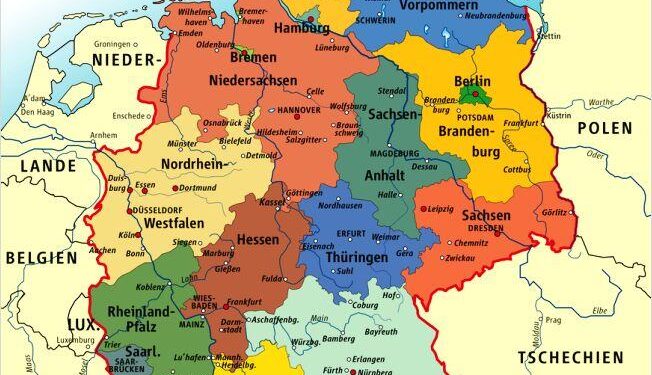Germany’s Finance Minister Friedrich Merz has revealed that the United States is actively considering participation in potential military strikes against Iran, highlighting escalating tensions in the region. Speaking to reporters, Merz indicated that Washington’s deliberations reflect growing concerns over Iran’s activities, which have heightened geopolitical uncertainties. The developments come amid ongoing discussions among Western allies on how to respond to Iran’s nuclear ambitions and regional influence, marking a critical moment in international diplomacy and security.
Germany’s Merz Signals Possible US Involvement in Iran Military Actions
German Chancellor Friedrich Merz recently hinted at intensified collaboration between the United States and European allies regarding possible military actions against Iran. In a statement that has stirred diplomatic discussions, Merz acknowledged that Washington is actively considering direct involvement in strikes targeting Iranian military installations, potentially marking a significant escalation in international efforts to curb Tehran’s regional influence.
This development emerges amid growing concerns over Iran’s missile capabilities and alleged support for proxy militias in the Middle East. Merz emphasized the need for a coordinated approach, highlighting key factors driving the consideration of US participation:
- Enhanced intelligence sharing among NATO allies
- Strengthening deterrence against further regional destabilization
- Protecting critical shipping lanes in the Gulf amid recent attacks
| Factor | Impact | Status |
|---|---|---|
| US Military Deployment | Increased readiness | Under Review |
| Diplomatic Coordination | Stronger alliance unity | Ongoing |
| Sanctions Enforcement | Economic pressure on Iran | Active |
Implications for European Security Amid Rising US-Iran Tensions
The escalating US-Iran tensions are casting a long shadow over European security architecture, compelling Berlin and other EU capitals to recalibrate their strategic postures. Germany’s revelation about Washington’s potential involvement in direct strikes against Iran accentuates a new layer of unpredictability that could destabilize the fragile security balance in the region. European nations face increasing pressure to respond decisively, balancing between diplomatic engagement and preparing for possible spillover effects such as disrupted energy supplies or heightened terrorism threats on the continent.
Key areas of concern for Europe include:
- Energy Security: Europe’s heavy reliance on Middle Eastern oil renders it vulnerable to price shocks and supply interruptions.
- Counterterrorism: Escalation risks emboldening proxy groups active within Europe, potentially increasing attacks.
- Diplomatic Cohesion: Divergent approaches among EU members toward Iran could weaken collective bargaining power.
| Factor | Potential Impact |
|---|---|
| US Military Involvement | Heightened regional instability |
| European Energy Dependence | Price volatility & supply disruptions |
| EU Diplomatic Unity | Risk of fragmentation in Iran policy |
Strategic Recommendations for Strengthening Transatlantic Cooperation and Regional Stability
In light of recent developments surrounding potential US involvement in military actions against Iran, there is an urgent need for European and North American allies to recalibrate their strategic coordination frameworks. Emphasizing transparent communication channels and joint intelligence sharing will be crucial to avoid miscalculations that could escalate tensions in an already volatile region. Enhanced diplomatic engagement-including regular trilateral summits-can reinforce trust, ensuring that any coordinated efforts address both security imperatives and broader geopolitical stability.
Furthermore, adopting a multifaceted approach that incorporates economic, military, and humanitarian tools will better position transatlantic partners to mitigate fallout from conflict risks. Key recommendations include:
- Establishing rapid response mechanisms to emerging crises to ensure timely collective action
- Expanding joint training and capacity-building initiatives with regional allies
- Investing in cyber defense and counter-disinformation campaigns to safeguard public trust
To contextualize priorities, the table below outlines core pillars critical to reinforcing transatlantic cohesion in this challenging period:
| Pillar | Focus Area | Outcome |
|---|---|---|
| Diplomatic Coordination | Regular Multilateral Dialogues | Shared Strategic Vision |
| Military Collaboration | Joint Exercises & Training | Operational Readiness |
| Cybersecurity | Joint Threat Assessments | Resilience Against Hybrid Threats |
| Economic Sanctions | Unified Enforcement | Maximized Impact |
Insights and Conclusions
As developments continue to unfold, Germany’s remarks on the potential US involvement in strikes against Iran underscore the growing complexity of international responses to regional tensions. Analysts and policymakers alike will be watching closely as diplomatic and military options remain on the table, shaping the trajectory of Western engagement in the Middle East. Further updates are expected as Washington and its allies weigh the implications of any coordinated action.
















